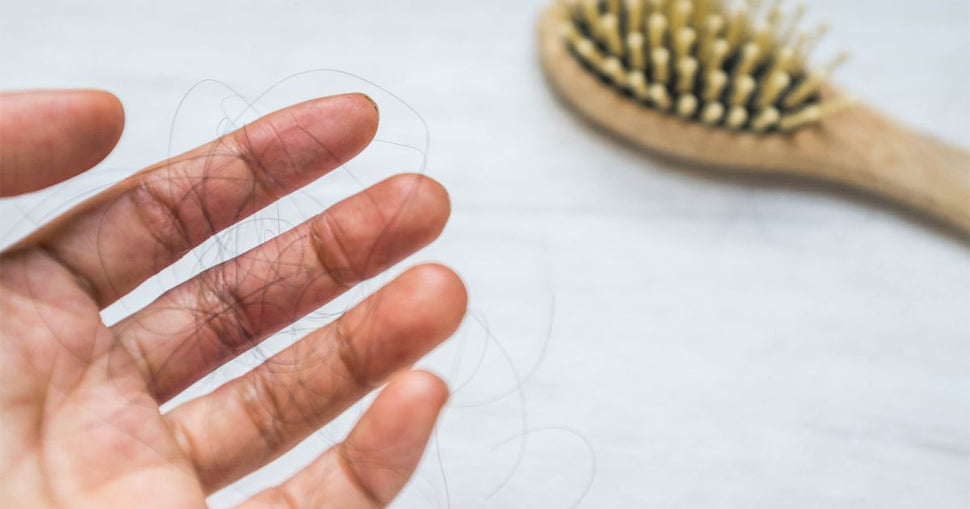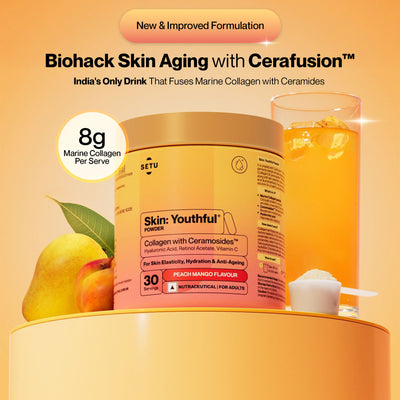Losing hair all of a sudden? Here's why
12 Aug 2021
Hair fall is a natural part of the hair growth cycle, and we all lose a little hair daily (scary, I know!). However, if you notice that excessive hair fall is causing your drains to get clogged or you spot bald patches on your scalp, then the loss could be due to an underlying medical condition that should be treated.
What is hair loss?
The average human head has between 90,000 to 1,50,000 strands of hair (1), and the hair growth cycle has four main phases: anagen, the growth phase; catagen, the transition phase; telogen, the resting phase; and exogen, the shedding phase.
In the anagen phase, our hair grows actively and this phase can last up to 7 years for some strands of your hair. During the second phase, growth slows down and the strands separate from follicles, the structures that lie below the skin and anchor hair strands; this phase lasts for about 10 days. In the telogen phase, hair growth stops and new hairs begin to form in hair follicles, this stage lasting for about 3 months. The exogen stage is an extension of the telogen stage and in it your hair begins to fall out. During this phase, you will lose about 50-100 hairs per day.
Sudden hair loss occurs when the hair growth cycle gets disrupted, or if a hair follicle gets damaged. In these cases, hair falls out more quickly than it is regenerated.
The causes of sudden hair loss
Some of the common causes of hair loss include:
- Androgenetic alopecia: This condition is also referred to as pattern baldness and is one of the most common causes of hair fall. Men tend to lose hair near their temples and on the top of their head, whereas women start balding at the crown or where they normally part their hair. This kind of hair loss is gradual and progressive and has been attributed to both genetic and environmental factors. (2)
- Pregnancy: Up to 90% of women face hair loss a couple of months after giving birth. (3) This shedding of hair happens because of declining estrogen levels in the body. During pregnancy, estrogen levels increase dramatically and hair loss goes down to very low levels. Post-delivery, these hormones come back to their normal levels and this causes more hair to fall out as your hair growth cycle returns its standard state.
- Telogen effluvium: This is a scalp disorder in which you experience excessive shedding of hair. Likely causes of this disorder include medications, trauma, emotional and physiological stress, illnesses like hyper and hypothyroidism, and an unhealthy diet. (4)
- Bad hair care practices: Grooming with hair styling tools like hair irons and blow dryers can damage hair and cause hair loss. Excessive grooming and tight hairstyles can also lead to fraying, breaking, and splitting of hair, damaging its overall quality and thickness.
- Medications: One may experience hair fall when on certain types of medication. Consuming blood thinners, cholesterol tablets, and anti-depressants can be the causes of sudden hair fall.
Symptoms of hair fall
It can be a little tricky to distinguish between normal hair fall and chronic hair loss. Here are some of the symptoms you should look out for when it comes to the latter:
- Gradual thinning on top of the head: You might notice your hair becoming thinner in certain places, like the crown of your head, along a parting, or at your hair line.
- Circular or patchy bald spots: You may lose hair in patches, leading to bald spots. You might also notice patches in your eyebrows or beard, and an itchiness in those areas.
- Patches of scaling that spread over the scalp: Patches of scaly skin could be a sign of ringworm or other infections, which can cause redness, swelling and inflammation—all of which can lead to hair loss.
How is hair loss diagnosed?
Your doctor will physically examine your scalp and ask you about your diet, hair care routine, and medical and family history. You may also be asked to undergo a blood test or a scalp biopsy, which involves examining your scalp skin or hair roots under a microscope, which will help diagnose possible disorders.
What are the treatment options for hair loss?
There are many effective remedies for hair loss. These include oral drugs, hair transplant or restoration surgery, and even laser treatments that stimulate hair growth.
To maintain healthy hair, you can also try certain home remedies:
- The topical application of flaxseed oil, evening primrose oil and coconut oil can promote hair growth. Another nature-based foodstuff that’s great for your hair is apple cider vinegar. ACV boosts hair quality and strength, giving you stronger, shinier hair.
- Omega 3 Supplements: Omega 3 is known to promote hair growth and strengthen hair follicles. Foods rich in Omega 3 fatty acids include fish like mackerel and salmon, walnuts, chia seeds and soybeans. If you’re unable to consume these foodstuffs in sufficient quantities, try out a supplement! Setu Veg Omega 3 is a vegan supplement that is great for your hair as well as your bones, heart, brain and eyes. It’s an all-round winner!
- Green tea: Green tea helps fight dryness in your scalp and can increase hair growth and regrowth by stimulating follicles. Soak a teabag in a cup of hot water, and after it has cooled, pour the liquid over your hair and gently massage it into your scalp. Wash thoroughly after an hour.
- Aloe vera: Aloe vera cleanses your scalp and conditions your hair, reducing hair breakage and hair loss. To use it on your hair, take out the pulp of one stalk of aloe vera and apply it to your scalp. Let it stay for 45 minutes before rinsing.
FAQs
1) What information can I give my healthcare provider to help him or her diagnose my hair loss?
Be as open as possible about your hair care routine, medical history, family history of hair conditions, and your own history with the problem.
2) Can stress cause your hair to fall out?
Yes, stress can be a cause of hair loss. Excessive stress causes your body to release stress hormones like cortisol that push hair follicles into the resting phase. As a result, your hair starts to fall out and no new strands grow.
3) What hairstyles cause hair loss?
Hairstyles that constantly pull on your hair like dreadlocks, buns, ponytails, hair extensions or weaves, cornrows and tightly braided hair can cause hair loss.
Skin: Renew - Glutathione - Orange Flavour
- ₹1,994
- ₹1,994
-
₹2,600 - ( 23% OFF)
Categories
- Choosing a selection results in a full page refresh.
- Press the space key then arrow keys to make a selection.
this is the sidecart












